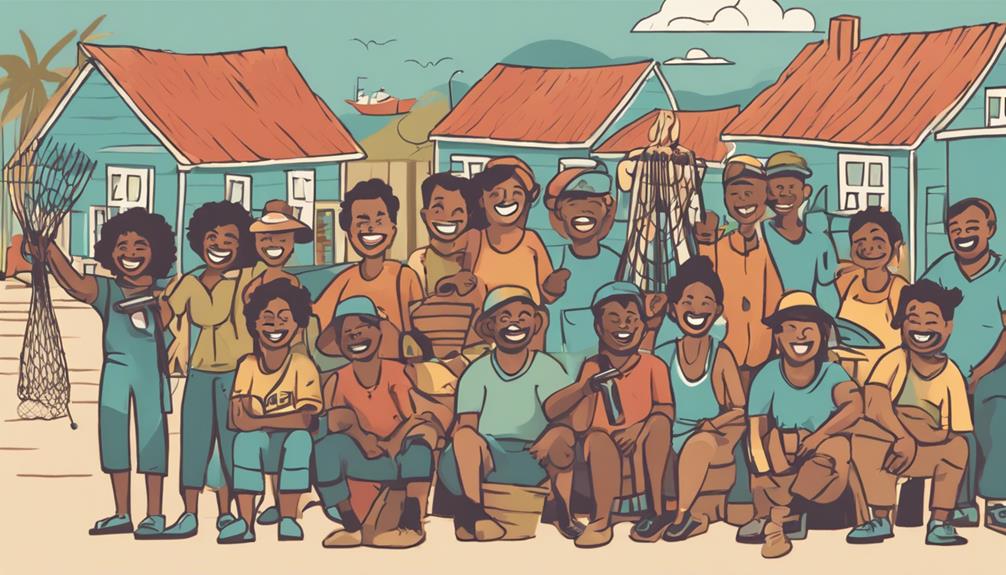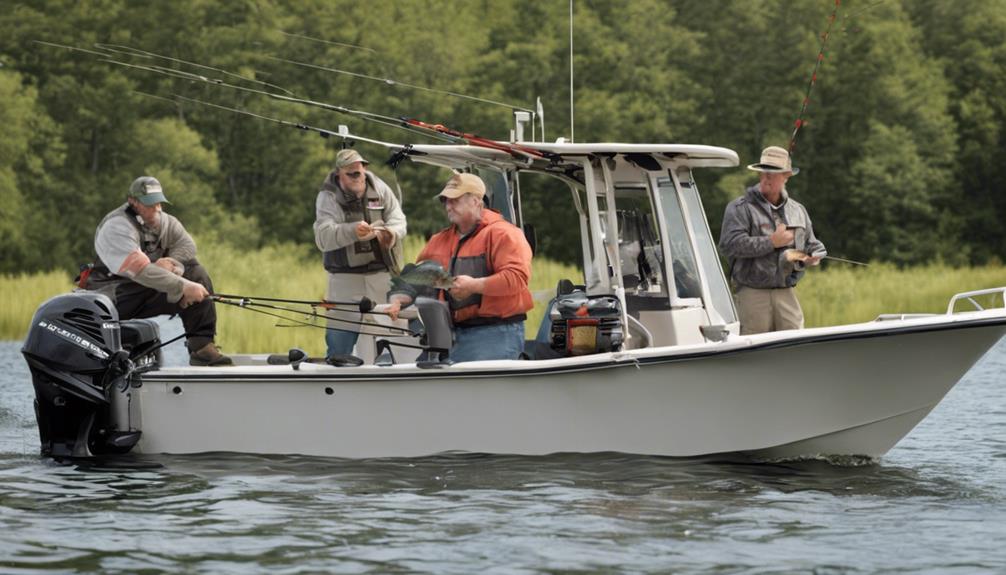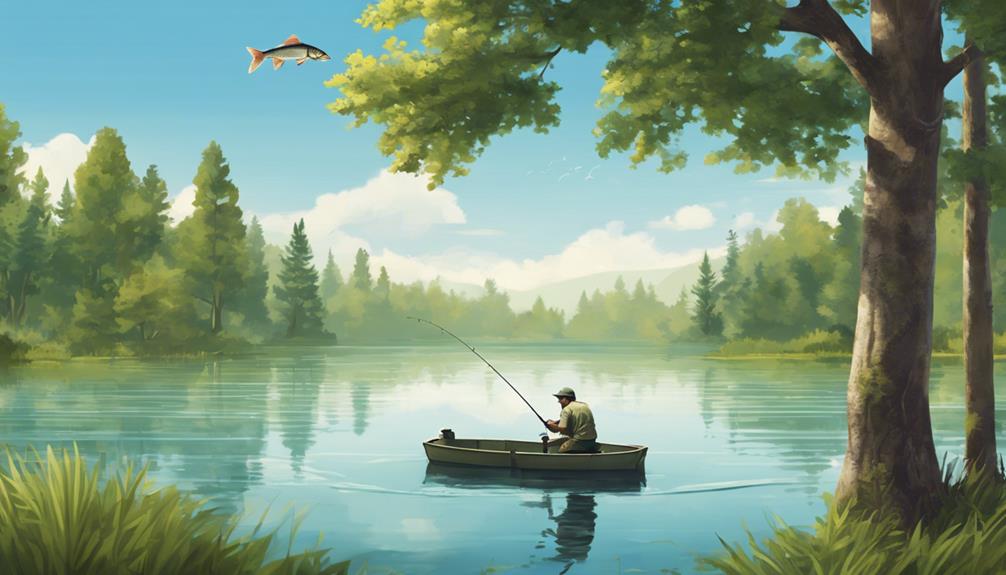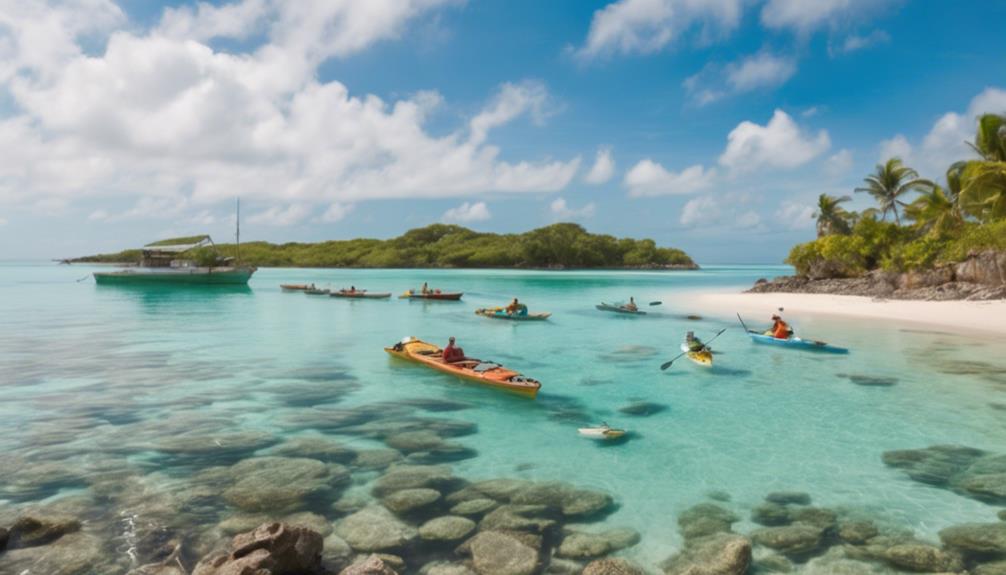If you've been searching for ways to support the conservation efforts of fishing communities, you might be intrigued by the diverse range of grants available to aid in this crucial cause. From government funding to private foundation opportunities and even corporate sponsorship programs, the options are vast. These grants not only aim to protect marine ecosystems but also strive to ensure the sustainability of fisheries for future generations.
By exploring these seven top conservation grants, you can make a meaningful impact on the preservation of our oceans and the livelihoods of fishing communities worldwide.
Government Grants for Fishing Conservation
When seeking government grants for fishing conservation, ensure your application clearly outlines the benefits to both the environment and local fishing communities. Government funding plays a crucial role in supporting initiatives that promote environmental protection while also sustaining the livelihoods of fishing communities. Highlighting how your project contributes to these dual objectives is key to securing grants for your conservation efforts.
Government funding for fishing conservation projects is often allocated to initiatives that demonstrate a tangible impact on environmental protection. Emphasize how your proposed activities will help preserve marine ecosystems, protect endangered species, or reduce overfishing. By showcasing the direct benefits to the environment, you increase the likelihood of receiving financial support for your project.
In addition to environmental protection, government grants for fishing conservation also aim to benefit local fishing communities. Illustrate how your project will create job opportunities, improve fishing practices, or enhance community engagement. By emphasizing the positive outcomes for local fishermen and their families, you can strengthen your application and make a compelling case for receiving government funding.
Private Foundation Funding Opportunities
Explore private foundation funding opportunities to expand your conservation efforts and support fishing communities. Private foundations play a crucial role in advancing marine conservation and promoting sustainable livelihoods for fishing communities. These foundations often prioritize projects that focus on preserving marine ecosystems, supporting sustainable fishing practices, and enhancing the well-being of fishing populations.
When seeking private foundation funding for your conservation initiatives, it's essential to align your project goals with the foundation's mission and priorities. Many foundations are dedicated to protecting oceans, coastal areas, and marine wildlife, making them ideal partners for initiatives related to marine conservation. By emphasizing the importance of sustainable livelihoods for fishing communities, you can demonstrate how your project contributes to both environmental preservation and community welfare.
Private foundation funding opportunities can provide the financial support needed to implement conservation projects, conduct research on marine ecosystems, and develop sustainable fishing practices. These grants often come with the added benefit of networking opportunities, partnerships with other organizations, and increased visibility for your conservation work. By leveraging private foundation funding, you can make a significant impact on marine conservation efforts while also supporting the long-term viability of fishing communities.
Corporate Sponsorship Programs for Fisheries
Consider leveraging corporate sponsorship programs to enhance the sustainability of fisheries and support fishing communities. Corporate sponsorship can provide vital support for conservation efforts and help ensure the long-term viability of fishing industries. By engaging with corporations, fishing communities can foster partnerships that benefit both the environment and the economy.
- Community Engagement:
Corporate sponsorship programs often include initiatives that promote community involvement in conservation projects, fostering a sense of shared responsibility among residents.
- Economic Impact:
Partnering with corporations can inject much-needed funds into local fishing economies, creating job opportunities and supporting sustainable practices that benefit both the environment and the community.
- Sustainability Initiatives:
Many corporate sponsors focus on supporting sustainable fishing practices, which can help preserve marine ecosystems and ensure the continued prosperity of fishing communities.
- Education and Outreach:
Corporate sponsors frequently invest in educational programs and outreach efforts that raise awareness about conservation issues and empower communities to take action in preserving their natural resources.
Non-Profit Organization Grants for Fishermen
Non-profit organization grants offer valuable financial assistance to fishermen seeking support for their livelihood and sustainable fishing practices. These grants play a crucial role in enabling fishermen to adopt responsible fishing techniques and contribute to the conservation of marine resources.
One key aspect that non-profit organization grants often focus on is community outreach. By providing funding for initiatives that educate and involve local fishing communities in conservation efforts, these grants help build awareness and promote sustainable practices.
In addition to community outreach, non-profit organization grants also support resource management projects. These projects may involve implementing strategies to monitor and protect fish populations, promoting habitat restoration, or conducting research to enhance understanding of marine ecosystems. By investing in resource management initiatives, non-profit organizations empower fishermen to engage in environmentally friendly practices that ensure the long-term health of aquatic resources.
Furthermore, non-profit organization grants can facilitate the development of partnerships between fishermen, conservation organizations, and researchers. These collaborations are essential for fostering innovation in sustainable fishing practices and creating a network of support for fishing communities. By leveraging the expertise and resources of different stakeholders, non-profit organization grants contribute to the establishment of holistic approaches to fisheries management that benefit both the environment and the livelihoods of fishermen.
International Conservation Grants for Fishing Villages
For fishing villages around the world, accessing international conservation grants can be a pivotal step towards sustainable practices and community development. These grants play a crucial role in supporting coastal sustainability projects, community outreach programs, marine conservation efforts, and economic empowerment strategies.
- Coastal Sustainability Projects: International conservation grants can provide funding for initiatives aimed at preserving coastal ecosystems, restoring mangroves, and implementing sustainable fishing practices that benefit both the environment and local communities.
- Community Outreach Programs: Through these grants, fishing villages can develop educational programs, workshops, and awareness campaigns to engage residents in conservation efforts, fostering a sense of stewardship towards marine resources.
- Marine Conservation Efforts: Funding from international sources can support the establishment of marine protected areas, biodiversity conservation projects, and research initiatives to safeguard vulnerable species and habitats.
- Economic Empowerment Strategies: Grants can enable fishing villages to diversify their livelihoods, invest in alternative income-generating activities, and promote sustainable tourism opportunities that reduce dependency on fishing while enhancing economic resilience.
Community-Based Funding Initiatives
Community-based funding initiatives offer fishing villages a direct and sustainable approach to secure financial support for conservation and development projects. These local initiatives are crucial for empowering communities to take charge of their own conservation efforts. By tapping into grassroots support, fishing villages can fund projects that are tailored to their specific needs and priorities.
Local initiatives often involve collaboration between community members, local organizations, and sometimes external partners. They enable fishing communities to address environmental challenges while also promoting sustainable practices that benefit both the ecosystem and the livelihoods of the people relying on it. Through grassroots support, these initiatives have the potential to create a sense of ownership and responsibility within the community, fostering long-term commitment to conservation efforts.
Grassroots funding initiatives can range from community-led fundraising campaigns to partnerships with local businesses and organizations. They provide a way for fishing villages to access resources that may not be available through traditional grant programs. Additionally, these initiatives can help build solidarity among community members, strengthening social ties and fostering a sense of unity towards a shared conservation goal.
Research and Innovation Grants for Fisheries
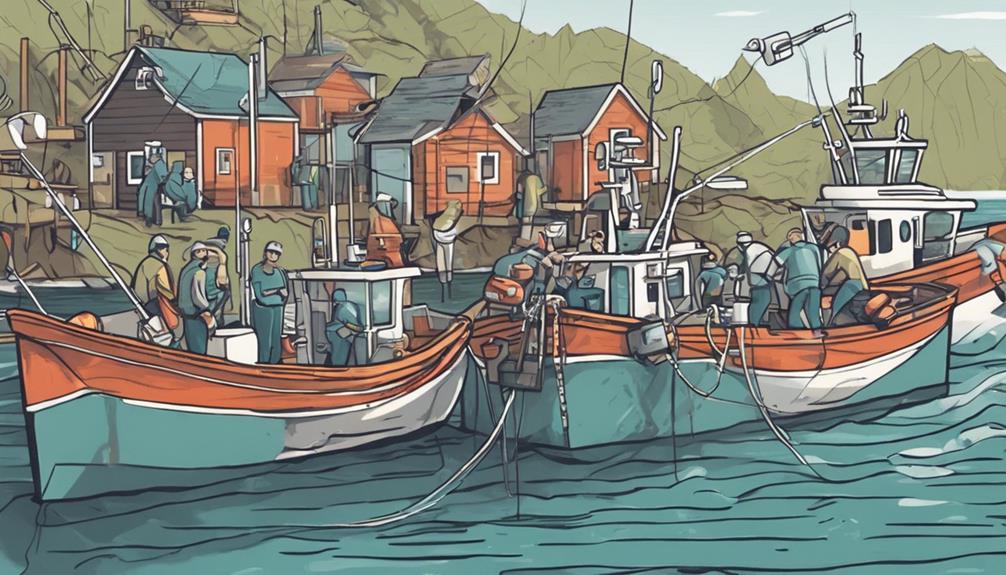
To support advancements in sustainable fishing practices and conservation efforts, consider exploring research and innovation grants tailored for fisheries. These grants can provide the necessary resources for implementing new technologies, strategies, and approaches that can enhance the sustainability of fishing practices. Here are some key points to keep in mind when considering research and innovation grants for fisheries:
- Innovation projects: Funding opportunities specifically designed to support innovative projects that aim to improve the efficiency, sustainability, and environmental impact of fishing activities.
- Research funding: Grants aimed at supporting scientific research initiatives focused on understanding fish populations, ecosystem dynamics, and the impact of human activities on marine environments.
- Technology development: Funding for projects that focus on developing new technologies, tools, and methods to reduce bycatch, minimize habitat destruction, and enhance resource management in fisheries.
- Collaborative partnerships: Grants that encourage collaboration between researchers, fishing communities, and industry stakeholders to foster knowledge exchange, promote sustainable practices, and drive innovation in the fishing sector.
Sustainable Fisheries Development Funding
Consider exploring available funding opportunities to support the development of sustainable fisheries practices. Sustainable Fisheries Development Funding plays a crucial role in promoting community engagement, capacity building, economic empowerment, and effective resource management within fishing communities. By accessing these funds, fishing communities can implement initiatives that ensure the long-term health of marine ecosystems while also supporting the livelihoods of those involved in the fishing industry.
Community engagement is key to the success of sustainable fisheries development. Funding can be used to organize workshops, training sessions, and outreach programs that involve local community members in decision-making processes regarding fisheries management. This active participation not only empowers community members but also fosters a sense of stewardship towards the marine environment.
Capacity building is essential for fishing communities to adopt and implement sustainable practices. With the support of funding, communities can invest in educational programs, technology upgrades, and skills training that enhance their ability to fish responsibly and manage resources effectively. This, in turn, leads to improved conservation outcomes and long-term sustainability of fish stocks.
Economic empowerment is another vital aspect that sustainable fisheries development funding addresses. By investing in projects that promote sustainable fishing practices, communities can secure their economic future while safeguarding the environment for generations to come. Proper resource management ensures that fish stocks aren't depleted, guaranteeing a steady income for fishing communities in the long run.
Frequently Asked Questions
What Are Some Common Challenges Faced by Fishing Communities in Accessing and Utilizing Conservation Grants?
Facing challenges in accessing and utilizing conservation grants is common for fishing communities. Limited awareness of available funding, complex application processes, and lack of capacity to meet grant requirements often hinder access.
Solutions include providing targeted outreach and education, simplifying application procedures, and offering technical assistance to build community capacity. Overcoming these obstacles can help fishing communities benefit from conservation grants and support sustainable practices.
How Do Fishing Communities Ensure the Long-Term Sustainability of Conservation Projects Funded by Grants?
To ensure the long-term sustainability of conservation projects funded by grants, you must prioritize accountability and community engagement.
By holding all involved parties responsible for project outcomes and involving community members in decision-making processes, you create a sense of ownership and commitment.
This fosters a culture of sustainability where everyone plays a role in protecting the environment for future generations.
What Are Some Innovative Approaches That Fishing Communities Can Take to Maximize the Impact of Conservation Grants?
To maximize impact, fishing communities can explore innovative approaches when utilizing conservation grants. By fostering partnerships with local organizations, implementing sustainable fishing practices, and educating community members, you can ensure long-term benefits.
Leveraging technology for monitoring and data collection can also enhance project outcomes. Remember, thinking outside the box and embracing new ideas will help you make the most of conservation grants for the well-being of both your community and the environment.
Are There Any Specific Criteria or Requirements That Fishing Communities Need to Meet in Order to Qualify for Conservation Grants?
To qualify for conservation grants, fishing communities must meet specific criteria. These can include demonstrating a commitment to sustainable resource management and actively engaging with the community.
By meeting these requirements, you can enhance your funding eligibility and access grant opportunities that support conservation efforts initiatives.
How Do Fishing Communities Navigate the Complex Application and Reporting Processes Associated With Securing and Managing Conservation Grants?
Navigating processes in securing conservation grants can be overwhelming, but breaking it down into manageable steps can help. Ensure you understand the application requirements and deadlines.
Keep detailed records of expenses and activities to ease reporting challenges. Seek guidance from experts or organizations that offer support in grant management.
Conclusion
Overall, there are numerous funding opportunities available for fishing communities looking to support conservation efforts. From government grants to private foundation funding, there are resources out there to help ensure sustainable practices in the fishing industry.
Whether you're a fisherman, a fishing village, or a research institution, these grants can provide the support needed to protect our oceans and preserve marine ecosystems for future generations. Take advantage of these opportunities to make a positive impact on our environment.
